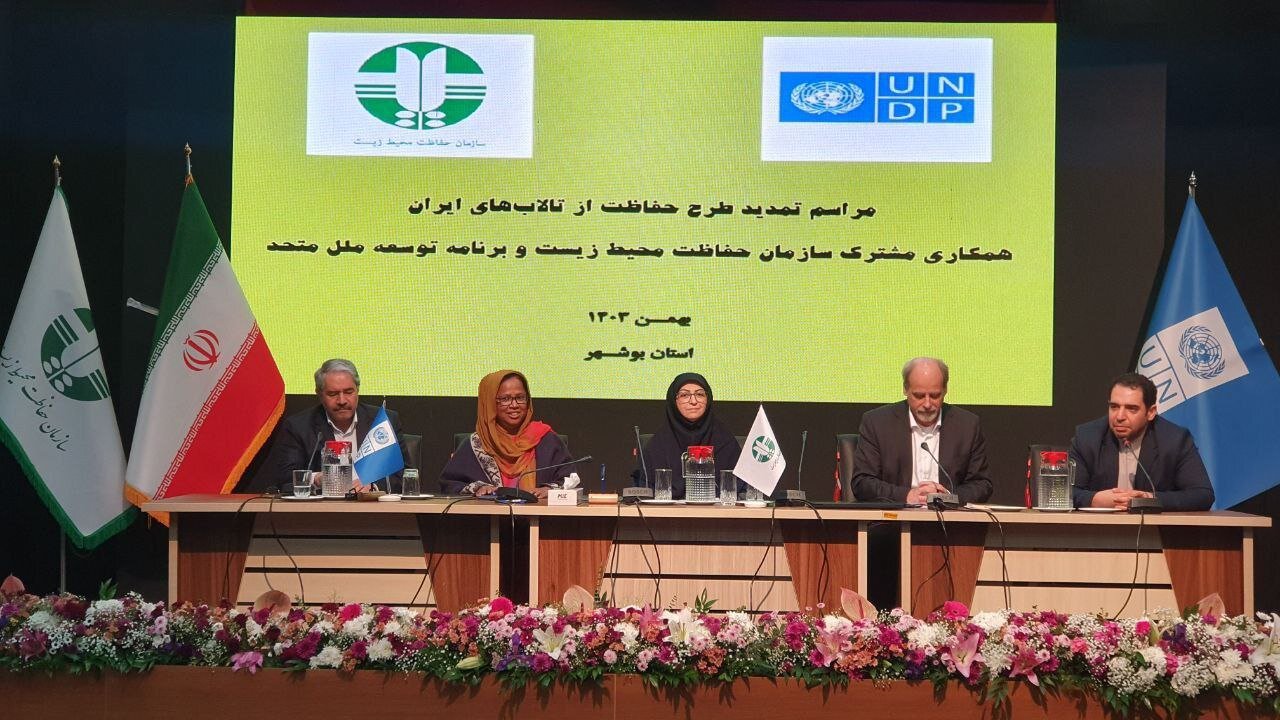Iran, UNDP extend MOU to preserve wetlands

TEHRAN—The Department of Environment (DOE) and the United Nations Development Program (UNDP) have extended their partnership by signing a three-year memorandum of understanding (MOU) to conserve Iranian wetlands projects in the country.
The MOU was signed by the head of DOE, Shina Ansari, and Resident Representative ad interim for UNDP in Iran, Ayshanie Medagangoda-Labé, in a meeting on Tuesday in Bushehr province, ISNA reported.
Launched in 2005, the Conservation of the Iranian Wetlands Project (CIWP) has been instrumental in safeguarding Iran’s target wetlands through an ecosystem-based management approach.
During the meeting, the UN Resident Coordinator for Iran, Stefan Priesner, said this MOU and its extension are among the most important pillars of wetlands conservation in the UN road map.
Iran plays a key role in establishing Ramsar Convention, highlighting that Ramsar Convention is one of the initial international agreements on sustainable development, he added.
The official went on to say “We are facing a triple environmental crisis including climate change, biodiversity crises, and air pollution. The United Nations has a precise and coherent plan to solve these three problems.”
On the sidelines of the event, the roadmap for Iran’s environment and biodiversity conservation was unveiled.
Conservation of Iranian Wetlands Project
Wetlands represent a vital ecosystem and are known as the kidneys of the Earth. These ecosystems, among other things, naturally clean water, protect against floods, recharge underground aquifers, and aid in maintaining surface water flow during dry periods.
Iran’s geography is distinct, teeming with diverse landscapes. The country has various wetlands, 27 of which were listed in the International Ramsar Convention.
Initially funded by the Global Environment Facility (GEF) from 2005 to 2014, the CIWP has since evolved, with UNDP and the DOE placing greater emphasis on sustainable agriculture and biodiversity conservation by fostering community participation in wetland management.
This long-standing collaboration has been made possible through the continued generosity of the People and Government of Japan over the past decade (2014-2024). Building on this support, in December 2024, UNDP welcomed a new contribution from Japan to further enhance wetland management and climate resilience in Iran.
Lake Urmia, a vital habitat for numerous plant and animal species, served as the initial pilot site for CIWP gradually expanding to Bakhtegan and Shadegan wetlands, and later to Anzali wetland.
The project aimed to alleviate pressure on the scarce water resources through climate-smart agriculture and water efficient practices on one hand and promoting diversification of incomes and sustainable livelihoods to enhance community resilience to climate change impacts on the other.
Over the past decade, through CIWP, UNDP has supported 14,732 farmers across 269 villages. This support has led to an average 30 percent reduction in irrigation water usage in pilot locations of the Lake Urmia Basin, and a 27.7 percent reduction in the Bakhtegan and Shadegan wetlands.
Across these regions, the project has also increased crop production by 22.5 percent while cutting chemical inputs, such as fertilizers and pesticides, by 25 percent or more. These efforts have significantly improved agricultural yields and crop quality in the Lake Urmia Basin, as well as in Bakhtegan and Shadegan wetlands.
Furthermore, to enhance the access of the local producers to the digital markets, 11 digital mini-hubs were established in East and West Azerbaijan provinces as connecting points where local producers can package, market, and onboard their products in digital platforms, offering a practical guide to how fit-for-purpose digital solutions can enhance social welfare and prosperity through a whole-of-society approach.
Experience shows that offering alternative means to livelihoods dependent on wetlands can eventually reduce the pressure and preserve these precious ecosystems and the biodiversity they support.
MT/MG
Leave a Comment